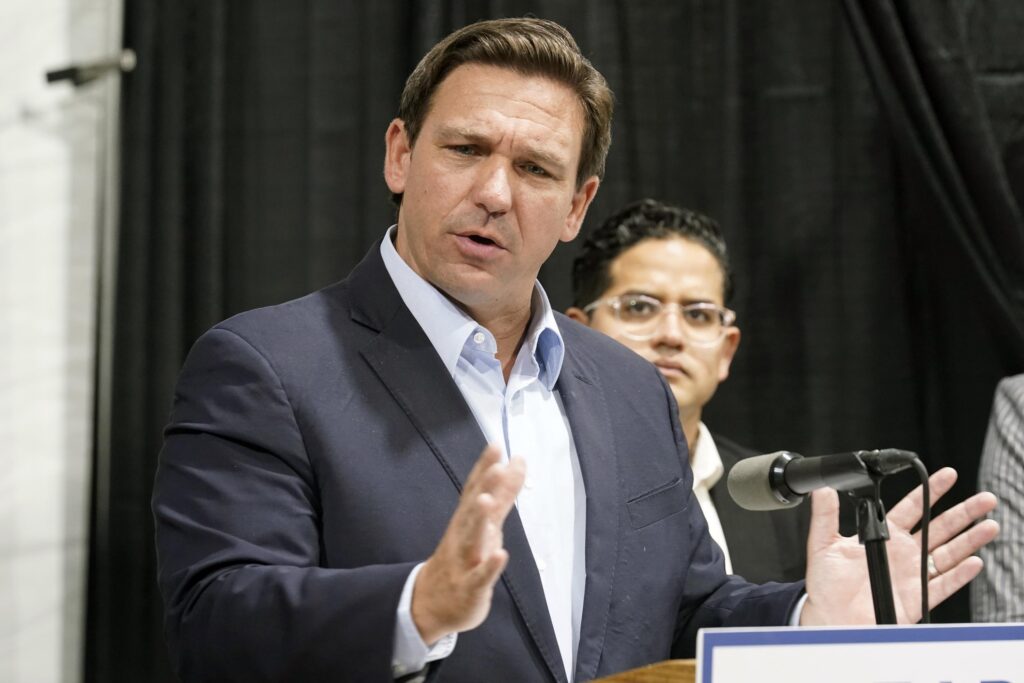At the close of a controversial, three-day special legislative session, Gov. Ron DeSantis signed four bills into law. Two lawsuits were filed on Friday over two of the bills.
During the special session, the legislature passed three bills: SB 2-C – The Congressional Districts of the State, SB 4-C – Independent Special Districts, and SB 6-C – Social Media Platforms.
DeSantis signed all three on Friday. He also signed a bill passed during the regular legislative session, CS/HB 7 – Individual Freedom. HB 7 bans critical race theory and “woke ideology” from being taught in the workplace and public schools in Florida.
Three of the bills will impact the Walt Disney Company, which expressed opposition to parental rights in education bills passed by the legislature and signed by the governor into law.
Former U.S. Attorney General Eric Holder sued Florida over the new redistricting map on Friday, arguing it violates the Fair Districts amendment of the Florida Constitution, which voters passed in 2010. Holder argues the new maps illegally favor Republicans and disenfranchise Black voters, as do Democratic lawmakers who protested against the bill on Thursday.
The three bills passed during the special session will establish the Congressional districts of the state, abolish independent special districts that were created before 1968, and revise the definition of a social media platform. The bills were passed despite Democrats halting legislative proceedings on Thursday when they held a sit-in, protesting against the redistricting plan.
The new law designed to abolish independent special districts isn’t meant to create any tax increases for Florida residents, the governor’s office said. In the near future, the legislature will propose “additional legislation to authorize additional special districts in a manner that ensures transparency and an even playing field under the law,” the governor’s office said in a news release.
Dissolving certain independent special districts established before the ratification of the Florida Constitution in 1968, including the Reedy Creek Development District, will strip the Walt Disney Company of its special government status, which has allowed it to operate as if it were a county.
At a bill signing event in Hialeah, DeSantis pushed back against Disney after it said last month it would work to repeal HB 1557, a parental rights in education bill banning curriculum that includes discussions on sexual orientation and gender identity.
Referring to Disney corporate executives, DeSantis said Friday, “You’re a corporation based in Burbank, California and you’re going to marshal your economic might to attack the parents of my state? We view that as a provocation and we’re going to fight back against that.
“It’s really, really problematic when a company that had been so, so synonymous with parents with young children to come out against the parents’ rights bill, but then to have those videos produced where they’re doing that — I’m just not comfortable having that type of agenda get special treatment in my state,” he said.
DeSantis was referring to videos published by Manhattan Institute’s Chris Rufo of a Disney guidance for employees instructing them on “white guilt,” “white fragility,” and other CRT concepts.
SB 6-C amends the definition of the term “social media platform” to remove the theme park exclusion from the definition. The new law will ensure “that litigation against inconsistent censorship practices of social media platforms and the de-platforming of politicians can be pursued and won in court,” the governor’s office said. Companies like Walt Disney that own theme parks can be penalized like Big Tech firms that censor their users under the law.
The bill also amends SB 7072, passed during the 2021 regular session, to address concerns related to social media platforms, including provisions with which the social media platforms must comply. It also prohibits the de-platforming of candidates for political office and prohibits social media platforms convicted of or held civilly liable for antitrust violations from contracting with public entities, according to the bill summary.
When signing HB 7 into law, DeSantis said, “We are not going to use your tax dollars to teach our kids to hate this country or to hate each other.”
After he signed it, attorneys from a Jacksonville law firm sued. Sheppard, White, Kachergus, DeMaggio & Wilkison, on behalf of several plaintiffs, sued DeSantis, Attorney General Ashley Moody and others arguing HB7 violates the First and Fourteenth Amendments.
“The First Amendment requires us to decide these issues through open and free debate, not by the fiat of Florida’s Governor and Legislature through constitutionally oppressive legislation,” the attorneys for the plaintiffs said in a statement. “This bill grossly infringes on the First Amendment’s fundamental guarantees of academic freedom, freedom of expression, and students’ right to access information regarding these topics.”
While some in the media and state legislature have describe HB 7 as racist or limiting discussion about race, it “includes the most substantial expansion of African American history in our public schools in the past 20 years,” Republican House Speaker Chris Sprowls said.
This article was originally posted on DeSantis signs four bills, prompting lawsuits against two of them











More Stories
Kemp signs executive order to extend suspension of Georgia’s motor fuel tax until July 14
Florida continues to outperform U.S. in economic success
Newsom announces funding expansion for reproductive services